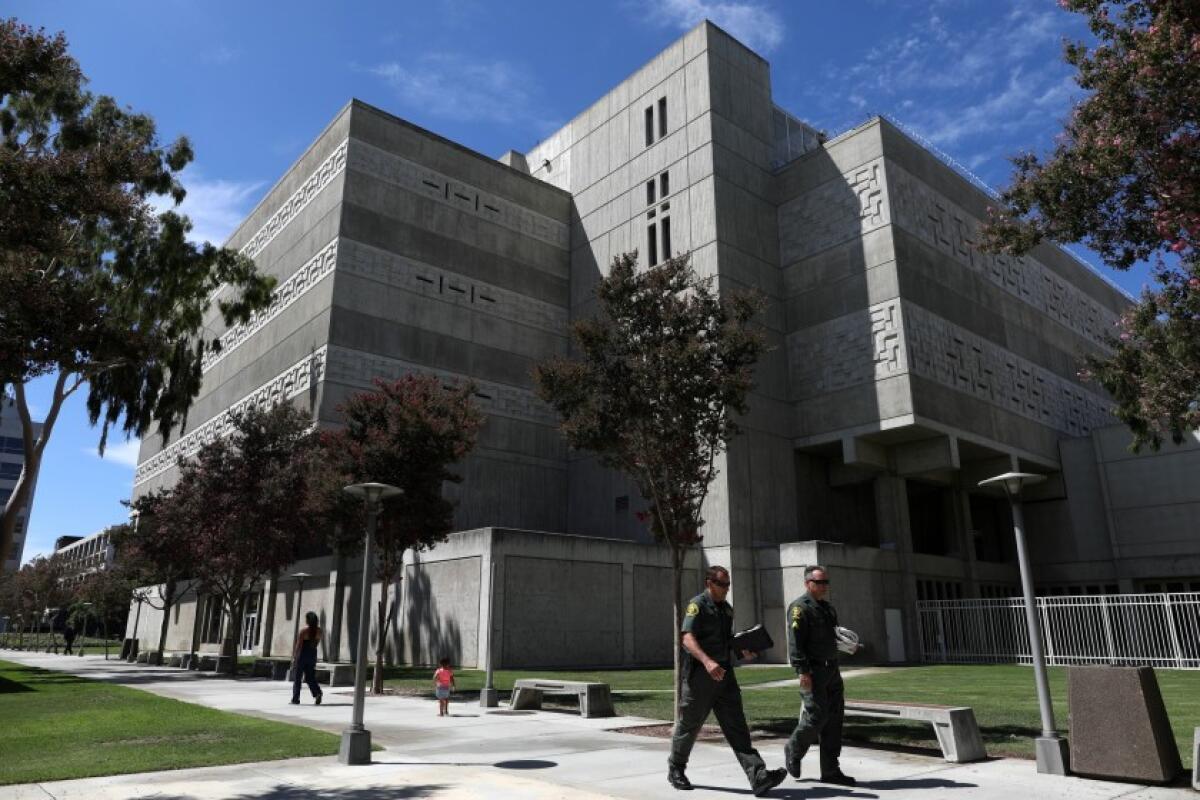UC Irvine program helps former inmates navigate college

- Share via
Hector Cervantes was 8 years old when he was first put in handcuffs for shoplifting.
A few years later, he was arrested for the first time on suspicion of drunk driving.
“That really sparked my entrance into the criminal justice system,” he said during a phone interview. “I was put on probation. And then shortly after that began my trajectory through the criminal justice system. I was arrested for things like not going to school, for vandalism, not being able to pay my DUI fines.”
The Santa Ana native and his four siblings were raised by a single mother. So he contends that many of his negative experiences were conditions of poverty, including his yearlong stint in a California prison for possession of controlled substances.
After being released from prison in 2012 and serving his parole, Cervantes enrolled in Santa Ana College. He eventually earned a bachelor’s degree in history and a master’s degree in urban and regional planning at UC Irvine.
It wasn’t easy for Cervantes to navigate through school, being a former inmate and the first person in his family to attend college.
For people who are formerly incarcerated, school campuses can be intimidating and lonely places. Cervantes said he felt a lack of community and other students couldn’t relate to his experiences.
“I experienced major cultural shock when I first got to UCI even though I grew up right down the street in Santa Ana,” Cervantes said.
While he was still in school, Cervantes was part of a group that advocated to bring a program called Underground Scholars to UC Irvine. The program was originally started at UC Berkeley in 2013, and has spread out to other University of California campuses since then. It provides resources and support to formerly incarcerated students on campus, as well as guidance for community college students who want to transfer to a university.
Last year, the program was officially established at UC Irvine, and Cervantes was named its director.
“I really just want to raise awareness, to let folks know that we’re here to serve them,” Cervantes said. “I really want to just increase access to UC Irvine and build a pipeline or a pathway for folks that are justice-involved.”

Cervantes said the program has engaged with about 60 students so far. It’s still growing as it’s only been officially on campus for about three months.
Cervantes said Underground Scholars operates under three pillars: recruitment, retention and advocacy. For its recruitment efforts, the program reaches out to community colleges, attends transfer workshops and works with UC Irvine’s undergraduate admissions office to connect with students who may want to come to the college. The program will help students with their personal statements and other parts of the application process.
Cervantes said he is developing an enrollment program that will give potential students a chance to experience what it’s like to be a UC Irvine student. Underground Scholars will partner with local community colleges and other regional colleges that provide educational programs inside of prisons.
On the retention side of the program, Underground Scholars shows formerly incarcerated students how to navigate campus and connects them to resources, like fellowships and employment opportunities.

The program also advocates for legislation to help incarcerated people and their student population on campus.
This kind of work isn’t new to Cervantes. Prior to founding Underground Scholars at UC Irvine, he worked as a policy advocacy fellow at Human Rights Watch, where he successfully took part in a movement to push through a state bill that ended the practice of sentencing 14- and 15-year-olds as adults.
“The reason why this is so important to me is because it’s important to have a sense of community and a sense of belonging, especially in a place that is so intimidating like a university,” Cervantes said.
Cervantes said he hopes the program will help overturn the school-to-prison pipeline by creating a prison-to-university pipeline.
The statewide Underground Scholars program is currently looking to get more funding from the state. Cervantes said he recently returned from a trip to Sacramento to meet with state officials. He said program leaders submitted a letter to the state asking for $4 million from the state budget. The funds would be spread out among the various Underground Scholars programs, he said. A host of social justice organizations signed the letter in support, including the American Civil Liberties Union.
Daisy Ramirez, Orange County jails conditions and policy coordinator at the ACLU, said Underground Scholars shows that programs that provide resources to formerly incarcerated students are needed. Ramirez has known Cervantes for a few years and has been familiar with Underground Scholars since it started at UC Berkeley.
“I think Underground Scholars is such a great example of what can happen when a community actually invests in the types of things that work, such as education,” Ramirez said. “... We often talk about the problems of incarceration and what’s happening behind jails and prisons. That’s incredibly important because there’s so many people in that situation. I think it’s also important to talk about what happens when folks are on the outside, and how we can invest in programs and resources that will help prevent folks from cycling back in.”
All the latest on Orange County from Orange County.
Get our free TimesOC newsletter.
You may occasionally receive promotional content from the Daily Pilot.






